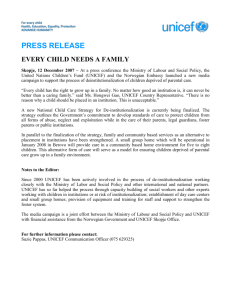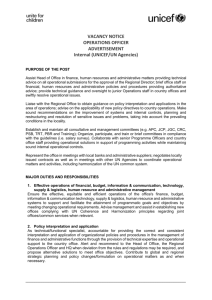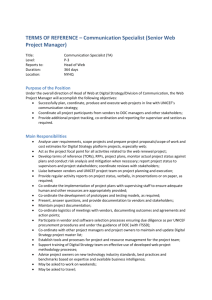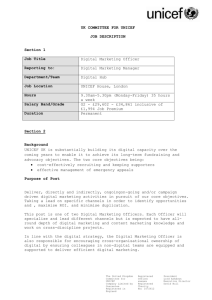Lessons Learned on Opening a Field Office, sent to Libya Crisis, 2011
advertisement
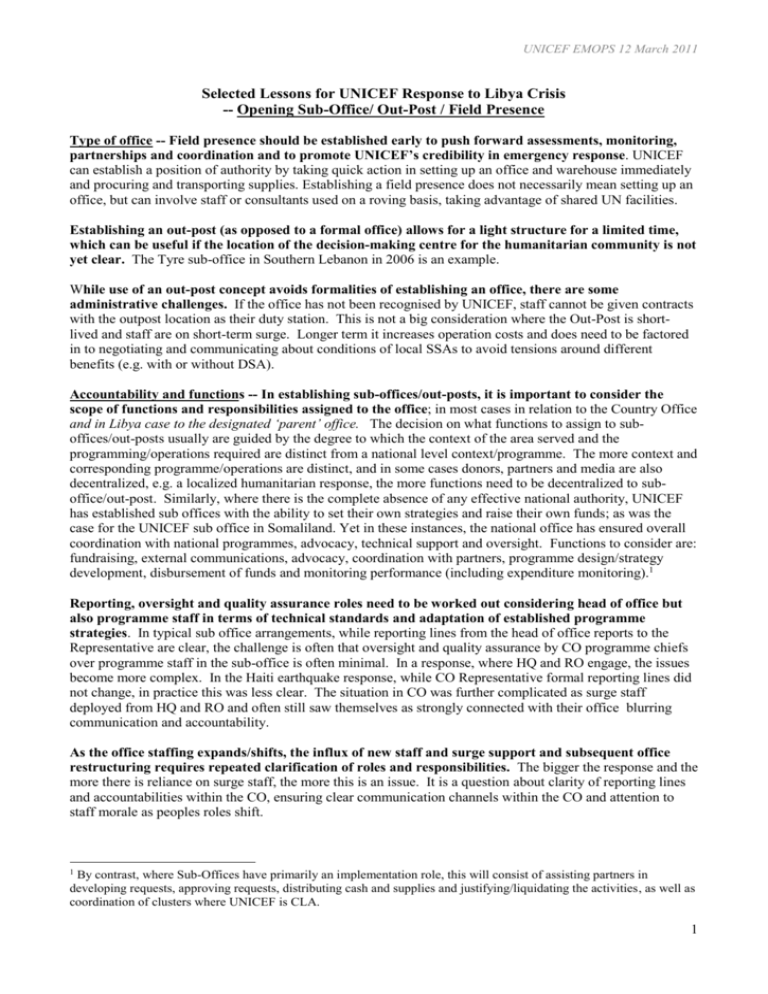
UNICEF EMOPS 12 March 2011 Selected Lessons for UNICEF Response to Libya Crisis -- Opening Sub-Office/ Out-Post / Field Presence Type of office -- Field presence should be established early to push forward assessments, monitoring, partnerships and coordination and to promote UNICEF’s credibility in emergency response. UNICEF can establish a position of authority by taking quick action in setting up an office and warehouse immediately and procuring and transporting supplies. Establishing a field presence does not necessarily mean setting up an office, but can involve staff or consultants used on a roving basis, taking advantage of shared UN facilities. Establishing an out-post (as opposed to a formal office) allows for a light structure for a limited time, which can be useful if the location of the decision-making centre for the humanitarian community is not yet clear. The Tyre sub-office in Southern Lebanon in 2006 is an example. While use of an out-post concept avoids formalities of establishing an office, there are some administrative challenges. If the office has not been recognised by UNICEF, staff cannot be given contracts with the outpost location as their duty station. This is not a big consideration where the Out-Post is shortlived and staff are on short-term surge. Longer term it increases operation costs and does need to be factored in to negotiating and communicating about conditions of local SSAs to avoid tensions around different benefits (e.g. with or without DSA). Accountability and functions -- In establishing sub-offices/out-posts, it is important to consider the scope of functions and responsibilities assigned to the office; in most cases in relation to the Country Office and in Libya case to the designated ‘parent’ office. The decision on what functions to assign to suboffices/out-posts usually are guided by the degree to which the context of the area served and the programming/operations required are distinct from a national level context/programme. The more context and corresponding programme/operations are distinct, and in some cases donors, partners and media are also decentralized, e.g. a localized humanitarian response, the more functions need to be decentralized to suboffice/out-post. Similarly, where there is the complete absence of any effective national authority, UNICEF has established sub offices with the ability to set their own strategies and raise their own funds; as was the case for the UNICEF sub office in Somaliland. Yet in these instances, the national office has ensured overall coordination with national programmes, advocacy, technical support and oversight. Functions to consider are: fundraising, external communications, advocacy, coordination with partners, programme design/strategy development, disbursement of funds and monitoring performance (including expenditure monitoring).1 Reporting, oversight and quality assurance roles need to be worked out considering head of office but also programme staff in terms of technical standards and adaptation of established programme strategies. In typical sub office arrangements, while reporting lines from the head of office reports to the Representative are clear, the challenge is often that oversight and quality assurance by CO programme chiefs over programme staff in the sub-office is often minimal. In a response, where HQ and RO engage, the issues become more complex. In the Haiti earthquake response, while CO Representative formal reporting lines did not change, in practice this was less clear. The situation in CO was further complicated as surge staff deployed from HQ and RO and often still saw themselves as strongly connected with their office blurring communication and accountability. As the office staffing expands/shifts, the influx of new staff and surge support and subsequent office restructuring requires repeated clarification of roles and responsibilities. The bigger the response and the more there is reliance on surge staff, the more this is an issue. It is a question about clarity of reporting lines and accountabilities within the CO, ensuring clear communication channels within the CO and attention to staff morale as peoples roles shift. 1 By contrast, where Sub-Offices have primarily an implementation role, this will consist of assisting partners in developing requests, approving requests, distributing cash and supplies and justifying/liquidating the activities, as well as coordination of clusters where UNICEF is CLA. 1 UNICEF EMOPS 12 March 2011 Key work process issues -- It is also important that the authority levels and work processes are decentralized to the sub-office consistent with the functions they are expected to fill. This includes consideration of adjustments to: Table of Authorities, Workplan approval, PCA approval and CRC process. Decentralization of work processes is all the more important the more the sub-office is difficult to access. For example, in DRC where the Goma sub-office was difficult to access, the CO recognized that it was too cumbersome to have contingency cash requisitions forwarded by the sub office to the capital and allowed contingency cash requisitions and payment requests from Goma to be authorised in Kinshasa justified by an email from the chief of field operations; but even this was still overly cumbersome, as the requisitions were already justified and approved by an AWP by the country office and by programme cooperation agreements. Information sharing channels -- It is critical to give attention to inter-office communications and information flow and feedback to office team. This requires consideration of different functions – decision-making around management of major risks and sensitive information; technical level problemsolving on functions requiring parent office/RO/HQ support – as well as at different levels -- both top management and technical focal points. Consider the quality of internet access in establishing an office. The bandwidth and reliability of the internet connection in the sub office is critical to the operational efficiency an office. Experience suggests that the internet connection is not sufficient to support UNICEF enterprise systems in 50% of the sub offices in the Indonesia, DRC and Guinea, for example. Sub offices that do not have PROMS spend excessive amounts of time emailing and calling those offices that have PROMS to inquire into the status of actions that affect them. When an office cannot operate PROMS it is far more likely that programmatic decisions will be made at the national office without consultation or information. Location -- Establishing a sub office in an administrative capital may facilitate relationships with local authorities, but at the expense of efficient humanitarian coordination in the field. UNICEF’s tendency is to set up offices in administrative capitals in order to facilitate a close partnership with local authorities. This is at odds with the more exclusively humanitarian agencies like UNHCR and WFP, who tend to set up their offices closer to the centre of their activities irrespective of proximity to local government structures. This difference in approach is visible in South Kivu and has led to some difficulty for inter-agency coordination. Staffing -- An effective balance between programme and operations staff has to be thought out in relation purpose and functions. In Guinea in both Nzerekore and Kissidougou sub offices only one out of twelve staff was a programme officer, the remainder being operations staff and the office chiefs. This was found to be a costly and dysfunctional allocation of staff. The other extreme, inadequate operations staffing, is equally problematic – in Haiti debriefings, concerns have been raised about the effectiveness of out-posts where programme staff lose a lot of time for lack of basic office set up and warehouse management. Shifting sub-office functions and exit – As the context shifts, the organization has to be attentive to adapting structure and functions of sub-offices/out-posts correspondingly – there is often a delay in making these shifts. In the Haiti response, the Lifeline office concept changed function at different times; for example, in initial days and weeks, a number of financial management functions were assigned to Santo Domingo but later shifted to Port-au-Prince as functions and especially communications were re-established; a branch of cluster coordination was anticipated to be located in Santo Domingo, but as the context changed and a consensus was reached with other organizations, the idea was dropped and all but Logistics Cluster shifted to Port au Prince. It is also necessary to anticipate closure of sub-offices and exit strategy. Sub offices set up for temporary humanitarian situations may become an inappropriate drain on resources if they remain in operation after their reason for existence has expired. Retooling such sub offices for programmatic functions has had little success. For example, the Kissidougou sub office in Guinea was set up to deal with the influx of refugees from the Sierra Leonean civil war who later returned. Whereas the other UN agencies have closed their sub offices in Kissidougou, UNICEF instead attempted to find another use for its sub office and used it to pilot a community level approach that was not developed as a coherent part of Country Programme; results of this initiative were unclear. 2 UNICEF EMOPS 12 March 2011 References Cosgrave, John and John Telford. (2006) “Joint Evaluation of the International Response to the Indian Ocean Tsunami: Synthesis Report (July 2006) Grunewald, Francois (2005) “Joint UNICEF-DFID Evaluation of UNICEF Preparedness and Early Response to the Darfur Emergency.” UNICEF. Julien Harneis (2010) Debriefing – Management of Sub-Offices (draft) Hermoso, Rafael (2008) “Lessons Learned / reporting mission to Banda Aceh and Nias, 27 Jan. 2008 – 3 Feb. 2008.” UNICEF (2005) “Evaluation of UNICEF Tsunami Response: Sri Lanka" UNICEF (2005) "Lessons Learned from the Tsunami Response – Health and Nutrition (EMOPS, 2005) UNICEF (2006) "EMOPS Debriefing Note Series: Debriefings at Senior Leaders Training October 2006.” . UNICEF (2007) “Lessons on Emergency Response -- from one ‘Rep’ to another.” UNICEF (2007) “UNICEF’s Initial Response to the Lebanon Crisis.” UNICEF UNICEF (2008) “UNICEF’s Role in Aceh and Nias: An Interim Evaluation of UNICEF’s Programmes, 2006-2007.” UNICEF (2011) “Synthesis of Lessons Learned on UNICEF Response to the Haiti Earthquake 2010” 3
![Water Crisis in Africa (Presentation) [download]](http://s3.studylib.net/store/data/009655902_1-138d767245b04f3c14e51911a4285588-300x300.png)
